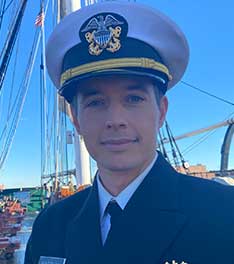
Solving for Carbon Neutrality at MIT Presentation: The Future is Electric
 Teams of students work through out the semester to study and develop these solutions, presenting a final project at the culmination of the course. One such presentation, The Future is Electric by Natalie Chehrazi, Justin Jiang, Alex Wunderlich, Jillian Uzoma can be viewed in the Resource Library.
Teams of students work through out the semester to study and develop these solutions, presenting a final project at the culmination of the course. One such presentation, The Future is Electric by Natalie Chehrazi, Justin Jiang, Alex Wunderlich, Jillian Uzoma can be viewed in the Resource Library.
LCDR Alex Wunderlich, US Navy, second year graduate student in MIT Mechanical Engineering and Naval Architecture shares insight into this final presentation and his experience with the course.
What prompted you to take this course?
My background is Nuclear Engineering and I've operated Navy Nuclear Reactors for several years (three of these years were underwater in a submarine!). I initially chose this path because of my passion for carbon neutral energy production. During my professional career I have observed public opinion weaken towards nuclear (after Fukushima) and I have watched renewable energy technology advance rapidly. So, although I'm still all for nuclear energy, I've shifted my passion more towards the renewable energy sector and carbon neutrality. I am still an active duty Naval Officer, but after my Navy career I plan to pursue a career that aligns with these passions and 2.832 was the perfect fit during my time at MIT to help me gain exposure to these fields.
What lessons, findings, or relationships will you take with you from this course?
We covered a broad spectrum of material in this course because the field of carbon neutrality itself is extremely broad. It requires a firm grasp on topics such as energy production, building or electrical efficiency, policy, economics, and several engineering disciplines. Because of this, we weren't able to take a deep dive into any one subject, but all of the material covered in this course seemed to point to one overarching theme: our future will be shaped by changes stemming from carbon neutrality requirements. The realization that this change is unavoidable, and already occurring rapidly, is what has stuck with me the most. Our future economy and way of life will be shaped by a shift from fossil fuels that will occur within the next 10-20 years, this includes energy production, taxes, transportation, and even our homes. Companies and institutions are already rethinking policies and operations to accommodate these changes. To get a feel for what's to come, just take a look at how many carbon removal or carbon counting startups have popped up within the past year.
What was it like working on projects that could apply to the very campus you were on as opposed to a hypothetical scenario?
In my academic experience, having a real project is always more enjoyable than a hypothetical scenario. Although it takes more legwork to get actual data or make realistic assumptions, I find that knowing my efforts could develop into meaningful, real world impacts is both rewarding and motivating. Taking it a step further and having the project be the very campus I'm working on is even more meaningful! I hope that 20 years down the road, students will be able to look back and see how our efforts shaped their reality, which will in turn motivate them to strive for a better future.

